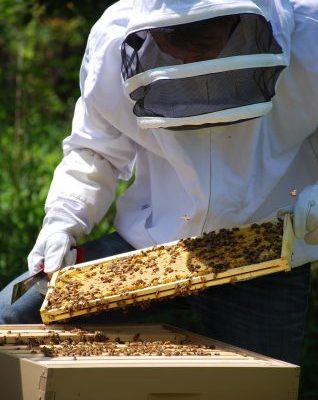
The Environmental Stewards is a scholarship group on campus that specializes in helping to make a greener, more sustainable Catawba College Campus and Salisbury community. The group is open to students who are majoring or minoring in an Environmental field. These students work all year long on projects that are thought-up, formed, and carried-out by the students with the help of the Catawba College Center for the Environment. The following is a Q&A with one of the Environmental Stewards, Joel Schlaudt, who created and implemented a system of beehives within our very own Stanback Ecological Preserve just this past year.
Q: What made you first interested in putting a beehive in the preserve?
Schlaudt: I kept a garden growing up, and that is when I first started to pay attention to bees, butterflies and other pollinators. Transitioning into college I had less time for being outdoors, but learned about honeybee populations being in decline, and I wanted to do something to change that, even if it was on a small, local scale. Spring of 2015 a friend told me about a nearby beekeeping class, I signed up and took it. I shared what I was learning with my classmates and with the Center for the Environment, who helped me realize the potential to have beehive on campus, in the preserve.
Where did you learn how to work with bees?
Schlaudt: I learned at a local county agricultural extension office. I learned the history, terminology and theory behind keeping bees, but so much of what I have learned has been from going into the hives, seeing how the colony operates, and helping the health of the hive as much as possible.
What is your favorite thing about working with bees?
Schlaudt: I enjoy most of it, but on a warm day when I open up a hive and smell the fresh wax and nectar, and hear the humming of hundreds of bees, that’s the best.
How much honey are you producing?
Schlaudt: It varies with the conditions of the hives, and if there is a lot of nectar available to the bees. Honey is harvested once a year, this year about 6 gallons of honey was harvested, after leaving enough in each hive for the bees to go through the winter.
What are you doing with all that honey?
Schlaudt: The honey is being sold; anyone is able to buy some, until the supply runs out. The money is going to go back to the bees, and for future students to be able to take beekeeping classes. The honey is sold in jars in four sizes, 4 oz is $4, 8oz is $8, and 16 oz is $13.
How can someone contact you, or the Center for the Environment, if they would like to purchase some honey or get involved?
Schlaudt: Contact the Center for the Environment at [email protected] or (704) 637-4727, or myself: [email protected]
[This article is featured in the Fall 2016 Print Edition of the Catawba Pioneer.]